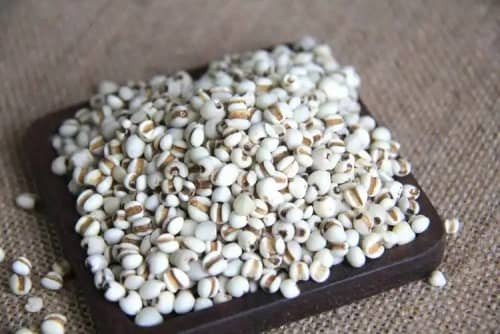In the world of natural remedies, Job’s Tears (Coix Seed, Yi Yi Ren, 薏苡仁) is considered a powerful “medicine” for combating various ailments. This remarkable traditional Chinese herb is not only known for its medicinal properties but is also widely used in therapeutic diets. Common medicinal congee recipes, such as yam porridge or lotus seed porridge, often incorporate Job’s Tears to enhance their healing effects.

Table of Contents
- What is Job’s Tears?
- Medicinal Properties and Benefits
- Common Uses in Traditional Chinese Medicine
- How to Use Job’s Tears
- Precautions and Contraindications
1. What is Job’s Tears?
Job’s Tears, also known as Coix Seed, is a widely used grain in both traditional Chinese medicine (TCM) and culinary applications. It has a mild, slightly sweet taste and is often added to soups, porridges, and herbal teas.
- Nature & Taste: Cool in nature, with a mildly sweet and bland taste.
- Meridian Channels: Enters the Spleen, Stomach, and Lung meridians.
2. Medicinal Properties and Benefits
Job’s Tears is highly valued in TCM due to its multiple health benefits:
✔️ Promotes Urination and Reduces Swelling – Effective for edema (water retention) and difficulty urinating.
✔️ Strengthens the Spleen and Drains Dampness – Helps alleviate digestive issues, bloating, and diarrhea caused by dampness.
✔️ Relieves Joint Pain and Discomfort – Used to treat rheumatic pain and stiffness (damp-heat arthritis).
✔️ Clears Heat and Expels Pus – Beneficial for lung abscesses, intestinal abscesses, and skin infections like boils and acne.
3. Common Uses in Traditional Chinese Medicine
- Treating Edema and Water Retention
- Job’s Tears helps expel excess fluids from the body, making it useful for swelling, bloating, and difficulty urinating.
- Supporting Digestive Health
- It strengthens the Spleen and Stomach, aiding in digestion and reducing chronic diarrhea caused by dampness.
- Alleviating Joint Pain
- Often used for arthritis and muscle stiffness associated with damp conditions.
- Clearing Lung and Intestinal Infections
- It helps reduce phlegm and pus, making it effective for lung infections, bronchitis, and intestinal abscesses.
- Improving Skin Health
- Traditionally used to treat flat warts, acne, and other skin issues related to damp-heat conditions.
4. How to Use Job’s Tears
The method of preparation varies depending on the intended health benefit:
- Raw Job’s Tears – Used for damp-heat conditions, such as infections and inflammation.
- Fried Job’s Tears – More suitable for strengthening the Spleen and stopping diarrhea.
Common Recipes
🍚 Job’s Tears & Red Bean Porridge – Helps drain dampness and relieve bloating.
🍵 Job’s Tears Tea – A simple tea made by boiling Job’s Tears in water, commonly used for detoxification and reducing puffiness.
🥣 Job’s Tears & Yam Soup – Strengthens the Spleen and Stomach, making it ideal for digestive health.
5. Precautions and Contraindications
⚠️ Not Suitable for People with Dryness or Fluid Deficiency – Job’s Tears promotes urination, which may worsen dehydration or dry conditions.
⚠️ Avoid During Pregnancy – It has a mild draining effect and is not recommended for pregnant women.
⚠️ Use with Caution in Cases of Constipation – Since it helps eliminate moisture, it may aggravate chronic constipation in people with insufficient body fluids.
Conclusion
Job’s Tears is a versatile medicinal food that supports digestive health, reduces water retention, alleviates joint pain, and improves skin conditions. However, it should be used wisely—raw for heat-related conditions and fried for digestive support. Those with Yin deficiency, pregnancy, or severe constipation should avoid excessive consumption.